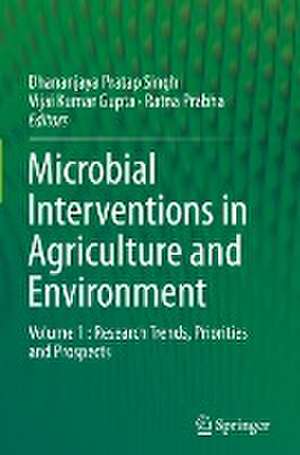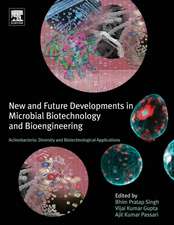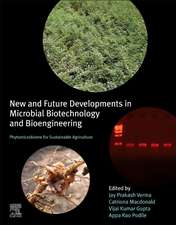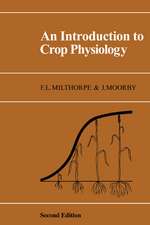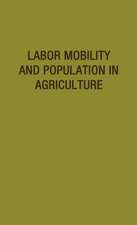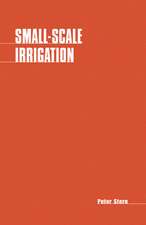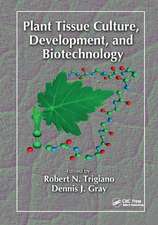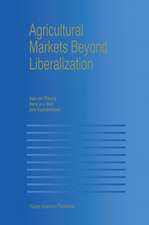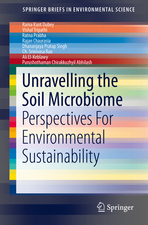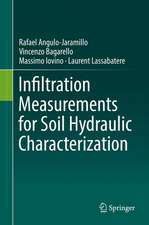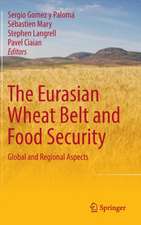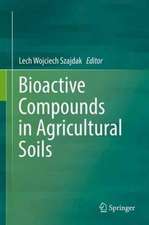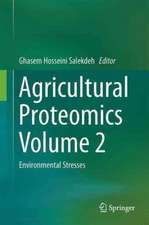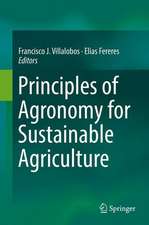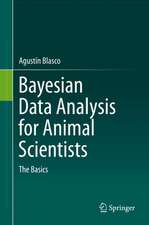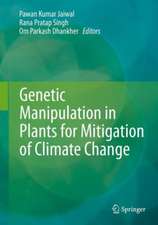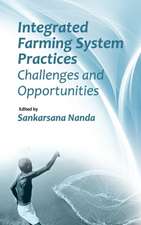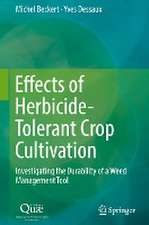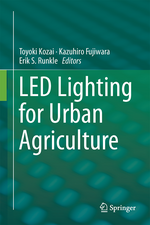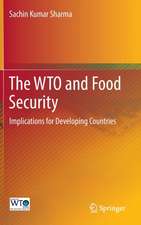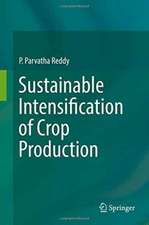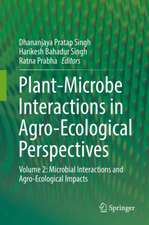Microbial Interventions in Agriculture and Environment: Volume 1 : Research Trends, Priorities and Prospects
Editat de Dhananjaya Pratap Singh, Vijai Kumar Gupta, Ratna Prabhaen Limba Engleză Hardback – 9 dec 2019
| Toate formatele și edițiile | Preț | Express |
|---|---|---|
| Paperback (2) | 1059.18 lei 38-44 zile | |
| Springer Nature Singapore – 25 noi 2020 | 1059.18 lei 38-44 zile | |
| Springer Nature Singapore – 20 dec 2020 | 1061.00 lei 38-44 zile | |
| Hardback (2) | 1078.38 lei 38-44 zile | |
| Springer Nature Singapore – 25 noi 2019 | 1078.38 lei 38-44 zile | |
| Springer Nature Singapore – 9 dec 2019 | 1084.74 lei 38-44 zile |
Preț: 1084.74 lei
Preț vechi: 1427.30 lei
-24% Nou
Puncte Express: 1627
Preț estimativ în valută:
207.59€ • 225.41$ • 174.38£
207.59€ • 225.41$ • 174.38£
Carte tipărită la comandă
Livrare economică 18-24 aprilie
Preluare comenzi: 021 569.72.76
Specificații
ISBN-13: 9789811383908
ISBN-10: 9811383901
Pagini: 638
Ilustrații: XIX, 596 p. 81 illus.
Dimensiuni: 155 x 235 mm
Ediția:1st ed. 2019
Editura: Springer Nature Singapore
Colecția Springer
Locul publicării:Singapore, Singapore
ISBN-10: 9811383901
Pagini: 638
Ilustrații: XIX, 596 p. 81 illus.
Dimensiuni: 155 x 235 mm
Ediția:1st ed. 2019
Editura: Springer Nature Singapore
Colecția Springer
Locul publicării:Singapore, Singapore
Cuprins
1.50 Years of Development of Beneficial Microbes for Sustainable Agriculture and Society: Progress and Challenges Still to be Met: Part of the Solution To Global Warming and 'Hothouse Earth.- 2.Metabolomics Approaches in Microbial Research: Current Knowledge and Perspective towards the Understanding of Microbe Plasticity.- 3.Is PGPR an Alternative for NPK Fertilizers in Sustainable Agriculture.- 4.Soil: Microbial Cell Factory for Assortment with Beneficial Role in Agriculture.- 5.Insights Into the Unidentified Microbiome: Current Approaches and Implications.- 6.Interactions in Soil-Microbe-Plant System: Adaptation to Stressed Agriculture.- 7. Microbe-mediated Tolerance in Plants against Biotic and Abiotic Stresses.- 8.Arbuscular Mycorrhizal Colonization and Activation of Plant Defence Responses against Phytopathogens.- 9.Microbes as Resource of Biomass, Bioenergy and Biofuel.- 10.Microbe-Mediated Reclamation of Contaminated Soils: Current Status and Future Perspectives.- 11.Plant Growth-Promoting Rhizobacteria (PGPR) and Fungi (PGPF): Potential Biological Control Agents of Diseases and Pests.- 12.Biofortification: A Promising Approach Towards Eradication of Hidden Hunger.- 13.Microbes in Foods and Feed Sector.- 14.New Edge Agricultural Bioinputs.- 15.Microbial Bio-production of Proteins and Valuable Metabolites.- 16. 2, 4-diacetylphloroglucinol: A Novel Biotech Bioactive Compound for Sgriculture.- 17.Coral Reef Microbiota and Its Role in Marine Ecosystem Sustainability.- 18.Diversity and Ecology of Ectomycorrhizal Fungi in the Western Ghats.- 19.Halotolerant PGPR Bacteria: Amelioration for Salinity Stress.- 20.Microbial Degradation of Nitro-Aromatic Pesticide: Pendimethalin.- 21.Nisin Production with Aspects on Its Practical Quantification.
Notă biografică
Dhananjaya P. Singh is presently Principal Scientist in Biotechnology at ICAR-National Bureau of Agriculturally Important Microorganisms, Maunath Bhanjan, India. He did his Masters' degree from G.B. Pant University of Agriculture & Technology, Pantnagar and Ph.D. in Biotechnology from Banaras Hindu University, Varanasi. His research interests include plant-microbe interactions, bioprospecting of metabolites of microbial and plant origin, microbe-mediated stress management in plants, metabolomics-driven search for small molecules and bioinformatics in microbial research. He has been working on the societal implications of microbial biotechnology pertaining to microbe-mediated crop production practices and rapid composting of residual agricultural wastes at farm and farmers levels. Such practices are now reaching among the farming communities for their adoption at field scale. He has been associated with the development of supercomputating infrastructure for agricultural bioinformatics in microbial domain at ICAR-NBAIM under National Agricultural Bioinformatics Grid (NABG) program of ICAR, India. He is an Associate of National Academy of Agricultural Sciences (NAAS), India and has been awarded with several prestigious awards including Dr. A. P. J. Abdul Kalam Award for Scientific Excellence. With more than 150 publications in the journals of National and International repute Dr. Singh has also edited five books on microbial research with Springer Nature and other publishers.
Dr. Vijai Kumar Gupta is the Senior Scientist, ERA Chair of Green Chemistry, Tallinn University of Technology, Estonia. His area of research interests are- Bioactive Natural Products, Microbial Biotechnology and Applied Mycology, Bioprocess Technology, Biofuel & Biorefinery Research, Glycobiotechnology of Plant-Microbial Interactions. He is the Secretary of European Mycological Association, Country Ambassador of American Society of Microbiology. He is the Fellow of- Linnaean Society; Mycological Society of India; Associate Fellow of National Academy of Biological Sciences India; Indian Mycological Association. He has published several papers in internationally well reputed journals and edited many many books for international publishers inclusing Springar Nature.
Ratna Prabha is currently working as DST Women Scientist at ICAR-National Bureau of Agriculturally Important Microorganisms, India. With Doctorate in Biotechnology and Masters in Bioinformatics, she is actively involved in different research activities. Her research interest lies in microbe-mediated stress management in plants, database development, comparative microbial analysis, phylogenomics and pangenome analysis, metagenomics data analysis and microbe-mediated composting technology development and dissemination. She has been engaged in developing various digital databases on plants and microbesand has various edited and authored books, many book chapters, and different research papers and review articles in journals of international repute.
Dr. Vijai Kumar Gupta is the Senior Scientist, ERA Chair of Green Chemistry, Tallinn University of Technology, Estonia. His area of research interests are- Bioactive Natural Products, Microbial Biotechnology and Applied Mycology, Bioprocess Technology, Biofuel & Biorefinery Research, Glycobiotechnology of Plant-Microbial Interactions. He is the Secretary of European Mycological Association, Country Ambassador of American Society of Microbiology. He is the Fellow of- Linnaean Society; Mycological Society of India; Associate Fellow of National Academy of Biological Sciences India; Indian Mycological Association. He has published several papers in internationally well reputed journals and edited many many books for international publishers inclusing Springar Nature.
Ratna Prabha is currently working as DST Women Scientist at ICAR-National Bureau of Agriculturally Important Microorganisms, India. With Doctorate in Biotechnology and Masters in Bioinformatics, she is actively involved in different research activities. Her research interest lies in microbe-mediated stress management in plants, database development, comparative microbial analysis, phylogenomics and pangenome analysis, metagenomics data analysis and microbe-mediated composting technology development and dissemination. She has been engaged in developing various digital databases on plants and microbesand has various edited and authored books, many book chapters, and different research papers and review articles in journals of international repute.
Textul de pe ultima copertă
Microbial communities and their functions play a crucial role in the management of ecological, environmental and agricultural health on the Earth. Microorganisms are the key identified players for plant growth promotion, plant immunization, disease suppression, induced resistance and tolerance against stresses as the indicative parameters of improved crop productivity and sustainable soil health. Beneficial belowground microbial interactions with the rhizosphere help plants mitigate drought and salinity stresses and alleviate water stresses under the unfavorable environmental conditions in the native soils. Microorganisms that are inhabitants of such environmental conditions have potential solutions for them. There are potential microbial communities that can degrade xenobiotic compounds, pesticides and toxic industrial chemicals and help remediate even heavy metals, and thus they find enormous applications in environmental remediation. Microbes have developed intrinsic metabolic capabilities with specific metabolic networks while inhabiting under specific conditions for many generations and, so play a crucial role. The book Microbial Interventions in Agriculture and Environment is an effort to compile and present a great volume of authentic, high-quality, socially-viable, practical and implementable research and technological work on microbial implications. The whole content of the volume covers protocols, methodologies, applications, interactions, role and impact of research and development aspects on microbial interventions and technological outcomes in prospects of agricultural and environmental domain including crop production, plan-soil health management, food & nutrition, nutrient recycling, land reclamation, clean water systems and agro-waste management, biodegradation & bioremediation, biomass to bioenergy, sanitation and rural livelihood security. The covered topics and sub-topics of the microbial domain have high implications for the targeted and wide readership of researchers, students, faculty and scientists working on these areas along with the agri-activists, policymakers, environmentalists, advisors etc. in the Government, industries and non-government level for reference and knowledge generation.
Caracteristici
Provides authentic and well-presented content with multiple microbial functions and their benefits in agro-ecology for readers to learn beneficial microbial processes, mechanisms and gaps in the knowledge Presents well-written and documented environmental problems in current perspectives and their microbial remediation for the researchers, faculties and students Presents characteristic microbial functions and their ecological benefits
